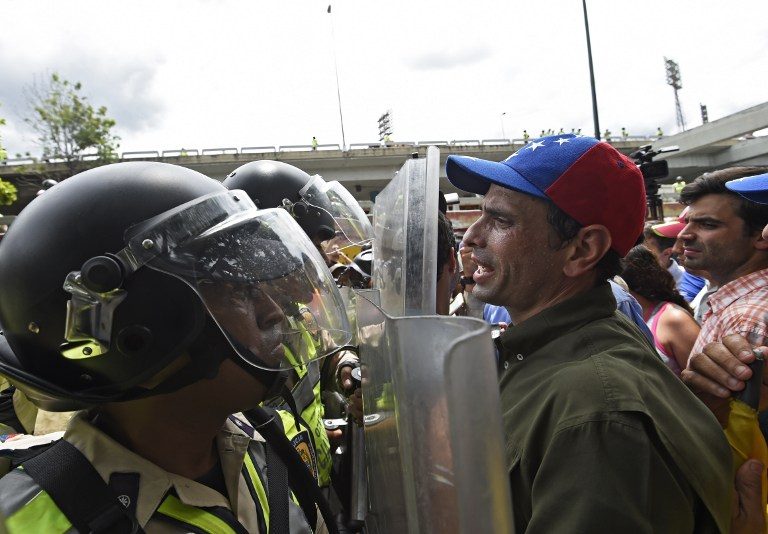SUMMARY
This is AI generated summarization, which may have errors. For context, always refer to the full article.

CARACAS, Venezuela – Venezuela’s opposition cleared its first hurdle Tuesday, June 7, in its uphill race to call a referendum on removing President Nicolas Maduro, whom it blames for driving the country to the brink of collapse.
But the leftist leader flexed his muscle when riot police fired tear gas to block opposition protesters from marching on the electoral authority’s headquarters, underlining the tension tearing at the country as it staggers through a painful crisis.
After weeks of pressuring the National Electoral Board (CNE) to allow the referendum process to go ahead, the opposition announced the board had accepted as valid 1.3 million signatures on a petition calling for a recall vote.
The decision moves the lengthy recall process on to the next step, in which at least 200,000 signatories must confirm their identity with fingerprint scans.
Under the constitution, the opposition would then have to gather four million more signatures (20% of the electorate) to trigger a recall vote.
Maduro’s opponents are racing to call a referendum before January 10 – 4 years into his 6-year term – when a successful recall vote would trigger new elections rather than transfer power to the vice president.
The opposition warns the once-booming oil giant risks exploding into unrest if authorities do not allow a referendum on Maduro’s rule, which has seen an economic implosion marked by severe shortages of food, electricity, medicine and other basic goods.
Seeking to pressure the electoral authorities, whom it accuses of dragging their feet, the opposition tried to march on the CNE’s headquarters, but heavily armored riot police broke up the protest.
It is the third time in recent days police have forcefully stopped attempts to march on the CNE.
Protesters had angry words for the police, shouting “Traitors!” and “You’re hungry too!”
About 1,000 demonstrators took part in the march, lining up behind a giant Venezuelan flag and chanting “This government will fall!” before police scattered them.
“We’re here in the street to get Maduro out. We want change in this country. We’re hungry,” said protester Richard Salas, an administrative worker who carried a sign with a long list of products that have disappeared from supermarket shelves.
‘No referendum this year’
Maduro’s camp accuses the opposition of rampant fraud in its signature drive.
“There won’t be a referendum this year,” Vice President Aristobulo Isturiz said bluntly on Monday.
Opposition spokesman Jesus Torrealba said the electoral authority would announce the procedures for the next stage in the recall process on Wednesday.
The initial petition, submitted on May 2, had some 1.8 million signatures.
Torrealba said a “badly done” verification process had disqualified 600,000 of them.
But “we have 6 times the (200,000) signatures we need to activate the recall referendum process,” he said.
Home to the world’s largest oil reserves, Venezuela has gone into an economic tailspin as global crude prices have plunged over the past two years.
The opposition, which Maduro brands elitist, has struggled to apply pressure by rallying mass demonstrations.
But spontaneous protests, riots and looting have broken out in neighborhoods once considered bastions for Maduro and late president Hugo Chavez, who launched Venezuela on the path of socialist “revolution” in 1999.
A woman died Monday, June 6, after being hit by a stray bullet when police opened fire on looters trying to ransack a warehouse in the western city of San Cristobal, her family said.
Maduro accuses the business elite of artificially creating shortages to destabilize his government.
International mediators led by Spain’s former prime minister Jose Luis Rodriguez Zapatero are trying to bring the government and opposition together for talks, but both sides have shown reluctance.
“We’re not going to sign up for hypocritical negotiations. If people don’t believe in Maduro, they’re not going to believe in talks,” said protest leader Henrique Capriles, who narrowly lost the 2013 presidential race to Maduro. – Maria Isabel Sanchez, AFP / Rappler.com
Add a comment
How does this make you feel?
There are no comments yet. Add your comment to start the conversation.